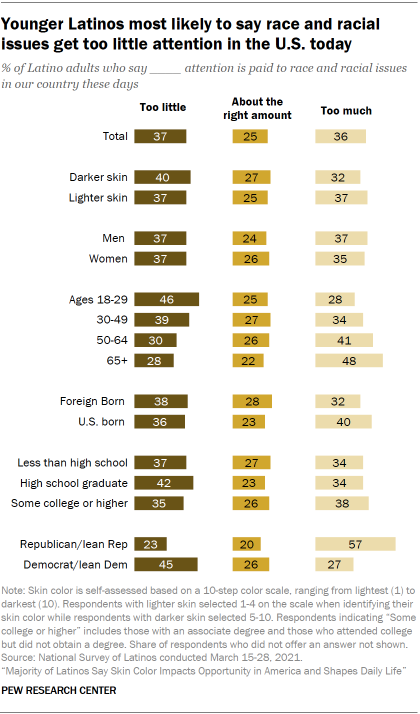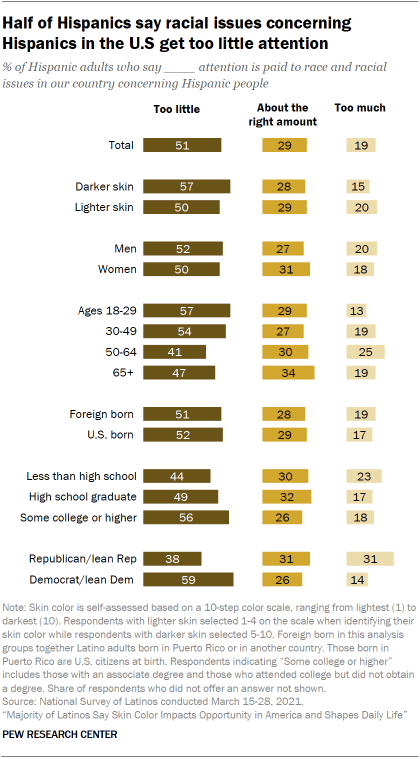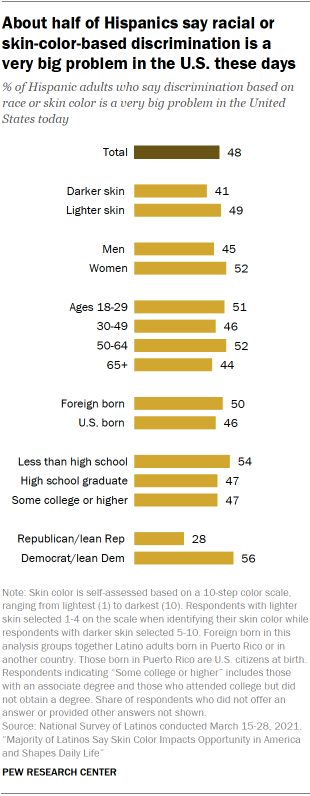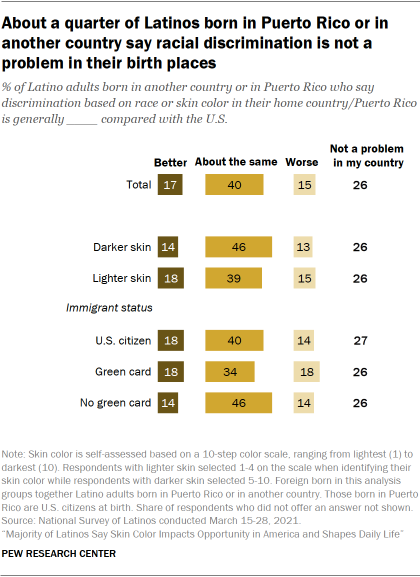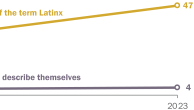Over the last decade, the United States has been deeply engaged in a national conversation surrounding race and racial discrimination, from the Black Lives Matter movement to growing attention about racial inequality and structural racism in America to concern about the rise in violence against Asian Americans. For U.S. Latinos, the survey finds divided views on how much attention is paid to race and racial issues in the country today.
A little over a third (37%) of Latino adults say there’s not enough attention paid to race and racial issues in our country these days; roughly the same share (36%) say there’s too much attention, and a quarter say the level of attention is about right.
Views are similarly split across Latinos with darker skin and Latinos with lighter skin. Among Latinos with darker skin, 32% say there is too much attention paid to race and racial issues in the country today, while 40% say there is too little attention paid and 27% say the amount of attention is about right. Latinos with lighter skin color are similarly split.
While almost equal shares across all Hispanic subgroups say the amount of attention paid to race and racial issues in the country today is right, there are differences in views of whether too much or too little attention is paid to race and race relations.
Opinions vary sharply across party lines: Over half (57%) of Republican and Republican-leaning Latinos think there’s too much attention paid to race and racial issues, compared with a little over a quarter (27%) of Democrats and Democratic leaners. By comparison, twice as many Democrats (45%) as Republicans (23%) say there’s too little attention to these issues in the country today.
The view that there is too much focus on race and racial issues in the country today is also more common among Latinos ages 65 and older (48%). By contrast, 28% of young adults, ages 18 to 29, say the same. The sentiment that there is not enough attention on racial issues is more commonly held by young adults (46%) than it is by those 65 and older (28%).
Similarly, Latinos born in the United States are more likely than those born in Puerto Rico or another country to say there is too much attention paid to race and racial issues today (40% vs. 32%).
Views about how much attention is paid to race and racial issues in the nation today are correlated with how Latinos describe their racial identity. Latinos who say most people would describe them as Hispanic or Latino on the street are more likely than those who say they would be described as White to say too little attention is paid to race and racial issues these days, 40% and 30% respectively.
Similarly, attitudes about how much attention is paid to race in the country vary by how Hispanics describe their racial and ethnic identity in an open-ended question. About half (51%) who described their racial-ethnic origin as American say there’s too much attention paid to race and racial issues in the country today, while 37% of those who described themselves as Latino or Hispanic or as having an origin in a Spanish-speaking country say the same.
While Hispanics are generally split on how much attention is paid to race and racial issues generally in the country today, when it comes to race and racial issues concerning Hispanic people, about half (51%) say too little attention is paid to them today. Meanwhile, 29% say the right amount of attention is paid to race and racial issues concerning Hispanic people and 19% say too much attention is paid to them.
Notably, the largest differences in views are along political party lines. Hispanic Democrats are more likely, at 59%, to say that race and racial issues concerning Hispanics get too little attention in the country today, while 38% of Hispanic Republicans say the same.
At the same time, Hispanics under the age of 50 are more likely than those 50 and older to say there is too little attention paid to race and racial issues concerning Hispanics in the country today. Some 57% of Hispanics ages 18 to 29 and 54% of those ages 30 to 49 say this, both higher shares than those ages 50 to 64 and 65 and older (41% and 47% respectively).
Similarly, those with at least some college experience are more likely than other Hispanics to say there is too little attention given to race and racial issues concerning Hispanic people nationally. More than half (56%) of Hispanics with some college experience say this, compared with 49% of high school graduates and 44% of those with less than a high school diploma. Still, significant shares of all three groups say too little attention is paid to race and racial issues among Hispanics in the country today.
There are also differences among Hispanics depending on their self-reported skin tone and their racial and ethnic identity. Half of Hispanics with lighter skin (50%) say race and racial issues concerning Hispanics get too little attention in the country today, while 57% of Hispanics with darker skin share this sentiment. About one-in-six Hispanics (59%) who described their origin, in an open-ended question, as being from a Hispanic country or region also say this. This is significantly higher than among Hispanics who identified their origin as American or White (47% and 46% respectively), though large shares of all groups agree that too little national attention is paid to race and racial issues concerning Hispanic people.
More than half of Hispanics say too little attention nationally is paid to racial issues concerning Asian people
While about half (51%) of Latino adults say race and racial issues related to Latino people get too little attention in the country today, views about the attention paid to racial and race issues concerning Asian people and Black people differ.
According to the survey, 55% of Latino adults say too little attention is paid to race issues concerning Asian people in the country today, 29% say about the right amount of attention is paid, and 14% say too much attention is paid to these issues. (The survey was fielded around the time that several hate crimes and violent incidents aimed at Asian Americans received broad coverage in the news.)
By contrast, a lower share of Latinos (30%) say too little attention nationally is paid to race and racial issues concerning Black people today, while 23% say the amount of attention paid is about right and 45% say too much attention is paid to these issues.
Among Latinos, roughly six-in-ten adults ages 18 to 29 (62%), individuals with some college experience or higher (60%) and U.S.-born Hispanics (58%) say too little attention is paid to race or racial issues concerning Asian people. Hispanics who described their racial origins as White in an open-ended question were the least likely to say Asian racial issues get too little attention, though 50% still agreed.
This story is different when it comes to national attention paid to racial issues concerning Black people today. Hispanic Republicans by far have the highest share among Hispanics who say these issues get too much attention today – roughly two-thirds (68%) of Hispanic Republicans say this. By contrast, Hispanic Democrats are most likely to say racial issues concerning Black people get too little attention (39%). Men and those 65 and older are among the demographic groups with the highest share who say that too much attention is paid to race and racial issues concerning Black people nationally (48% and 49% respectively).
About a half of Latinos say discrimination based on race or skin color is a big problem in our country today
Discrimination based on race or skin color is seen as a very big problem in the U.S. today by 48% of Latino adults. An additional 32% say it is a moderately big problem.
Views of racial and skin color discrimination do not vary much across many demographic subgroups, except when comparing across party affiliation and gender. Republican and Republican-leaning Hispanics are among the least likely to agree that racial discrimination is a very big problem these days (28%); by comparison, a majority (56%) of Democrats and Democratic leaners say this. Additionally, a larger share of women than men say racial discrimination is a very big problem (52% vs. 45%).
Latinos with lighter skin are more likely than Latinos with darker skin to say discrimination based on race or skin color in the U.S. is a very big problem (49% vs. 41%).
Views of racial discrimination outside the 50 U.S. states and D.C.
Latinos born in another country and those born in Puerto Rico were asked how discrimination based on race or skin color in their home country or Puerto Rico compares with that in the United States.4
Among Latinos born in another country or Puerto Rico, four-in-ten (40%) say discrimination based on race or skin color is about the same in both the place of their birth and in the U.S., while 17% say things are better in the place of their birth than in the U.S. and 15% say things are worse in the place of their birth than in the U.S. About a quarter (26%), though, say discrimination based on race or skin color is not a problem in the place of their birth.
Among those born in Puerto Rico or in another country, similar shares of Latinos with darker skin color and lighter skin say discrimination based on race or skin color is about the same in both the places of their birth and in the U.S. – 46% and 39% respectively. But otherwise, views about racial discrimination in both places is about the same. For example, 26% of both Latinos with darker skin and those with lighter skin say discrimination based on race or skin color is not an issue in the places of their birth (Puerto Rico or another country).
